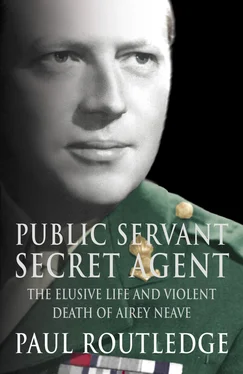Neave was taken to an upper floor where a young, uniformed SS officer questioned him closely in English, while a typist took down his answers. Years later he confessed, ‘I was in great terror, though I tried to appear calm and innocent.’ 7 Neave insisted to his interrogator that he had got the idea from other prisoners, working near Graudenz, which was half true. He had been inspired by the Canadian flying officers at Thorn and had planned to escape by stealing an aeroplane, because Forbes was a pilot. ‘You are lying,’ said his inquisitor. ‘You are a spy. You were taking this to the Russians.’ Neave maintained that they were not, and told the curious officer that they were trying ‘the same game’ as the Canadian escape, of which his captor was unaware. The SS officer telephoned Thorn camp and received verification that there had been just such an escape bid, and that prisoners Neave and Forbes were indeed missing. Gradually, the tension eased. They were joined by another SS man, and began talking more casually about the war, referring to a map on the wall. Neave’s brave sally that Britain would win the war prompted cynical laughter. They asked if Polish peasants had helped their escape, and Neave, still wearing his peasant’s corduroy trousers, diverted the questioning to German mistreatment of the Poles. The SS men showed utter contempt for the Poles and their Catholicism, but they ceased interrogating him about spying. Neave’s composure gradually returned. He asked his blond young interlocutor what he had been doing before the war, and, with his resentful admission that he had been at university studying for his doctorate of philosophy, the interrogation ended. Neave and Forbes were marched through the streets of Plock under armed guard to the town prison and put into solitary confinement. Their pathetic civilian disguises were exchanged for coarse grey prison clothes. Neave slept for several hours before being roused for his evening ‘meal’, a bowl of swill containing bad potatoes and swedes. The Polish orderly boy, in prison clothes, whispered that the other inmates knew their identity, and managed some patriotic sentiments before continuing his round.
But Neave’s ordeal was not yet over. Above the door of his cell a notice identified him as ‘Neave, Airey. Spion’. For two days, he recovered in his cell, sleeping most of the time between ‘lunch’ of bread and turnip soup and a half-hour exercise period. Separated with Forbes from the other inmates, he hobbled round the prison courtyard, quietly exchanging details of their interrogation. To Neave’s relief, Forbes had given the same story about the aerodrome map. They had already concocted an agreed version of their escape from the camp, exonerating British other ranks. Neave’s reverie was interrupted some days after the initial interrogation by his gaoler’s curt insistence: ‘The Gestapo wants you.’
Back in the Gestapo building, he had a new, more vicious interrogator, this one with close-cropped black hair and a scarred face. He was just finishing questioning a defiant Polish woman, to whom Neave offered a sympathetic smile. ‘Go on, smile you English officer,’ raged his Nazi debriefer. ‘You started this war. You brought these Poles into it. Both of you are spies! Spies! Spies!’ The SS man glowered at Neave, with, as he thought, ‘murder in his eyes’, and challenged his cover story. The Graudenz map, he shouted, must have come from a Pole. Neave reiterated that it had come from a British prisoner of war. Who? He refused to say. Then, English gentleman, added the plain-clothes SS man, he would remain a guest of the Gestapo until he thought better of his obstinacy. Suddenly the officer softened, becoming for a moment a soldier like Neave. The prisoner should not think, he said, that just because he was in civilian clothes he had not fought like the lieutenant. In fact, he had seen action on the Polish Front, and a small ribbon in his button denoted an award for bravery. ‘Go, Herr Neave, and think things over,’ he admonished.
Back in his prison cell, Neave contemplated his position. He trembled at the prospect of further interrogation, fearing that if physically tortured he would reveal more of the truth. He felt defenceless and alone, anxious lest he face execution like the Polish officer in the cell opposite sentenced to death for killing a Gestapo agent. He prayed, cursed and patrolled his cell agitatedly. ‘I closed my eyes, and despair came over me like a great fog,’ he wrote later. 8 ‘I could not see a way out of the darkness.’ In his dreams he was tramping through swamps of dark, stagnant water on the road to Russia, the way marked with the bones of former travellers. The next morning brought relief; he was awoken by the warder who addressed him as Herr Leutnant, and told him he was going back to Thorn ‘with Oberleutnant Forbes’. Once again, he was a British officer. The attitude of his gaolers changed markedly. They were handed back their civilian clothes, including the hated rucksack with its remaining sardines and condensed milk. Neave also retrieved his pipe, tobacco and the box of matches with its concealed compass. With Teutonic thoroughness, everything had been returned, except the map that almost cost him his life. He had memorised the layout of Graudenz, however.
After ten days, the escapers were taken back by train from Plock to Thorn, along the north bank of the Vistula that had been their bearing for Warsaw. They talked amiably of the war to their guards, who knew less than they did. The POWs at Thorn had a radio receiver smuggled in in a medicine ball from Spangenburg. Their welcome at Thorn was less agreeable than their departure from the clutches of the Gestapo. A furious German officer, whose guards had allowed them to escape, drew his revolver and marched them ‘ Hande hoch ’ to windowless dungeons in the outer wall of the fortress. When they protested at the pigsty conditions a sentry thrust his gun down the ventilation hole into Neave’s cell. ‘If you are swinehounds, you must expect to be kept in pigsties,’ he yelled. Neave threatened to report his filthy language to the Kommandant and the gun was hastily withdrawn.
After a night in appalling conditions, they were locked in a room above the keep, without furniture but for two beds, while weighing over their failed escape bid. They came to one maddeningly simple, but vitally important, conclusion. They had tried to cross the Polish countryside too quickly and without method. ‘We had, as it were, charged the barricade of the General-Government frontier without calculation,’ he decided. And yet they had got so close to Warsaw. It would have been comparatively simple to skirt the ill-defined border through the woods and make their way to the capital. Moreover, in such inhospitable terrain, an escaper had to understand the strain his vulnerability would place on his spirit. ‘Loneliness and physical stress undermine the most resolute,’ he wrote. 9 The escaper must conserve his forces by lying up in the warmth for long periods. The lessons of this failed escape bid were not lost on him.
On being sent back to his room in the fort, Neave found that his short period of freedom had given him fresh strength. He went back to the novels of Victorian England that reminded him so much of home, and found an inner peace. One night, after he had finished Mrs Henry Wood’s sentimental melodrama, East Lynne , he was roughly roused by a German guard and told that he was being moved immediately. ‘We have had enough trouble with you,’ said the guard. Gathering his few belongings in a bundle, he joined a small party of prisoners among whom he recognised Forbes. ‘Where the hell are we going?’ asked Neave. ‘To the Bad Boys’ Camp at Colditz,’ came the reply.
Читать дальше












